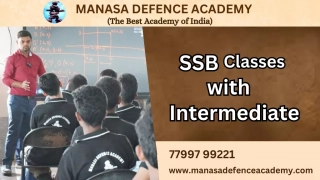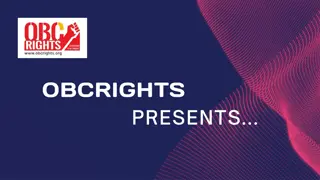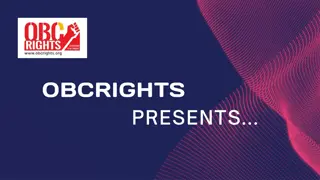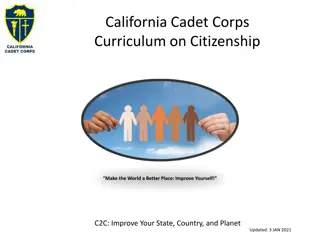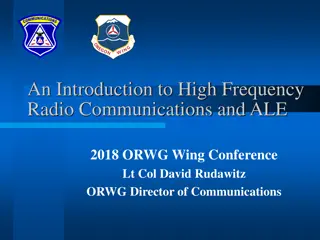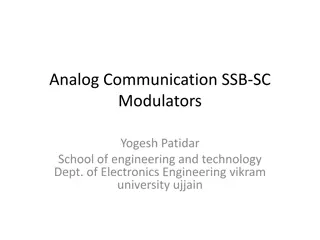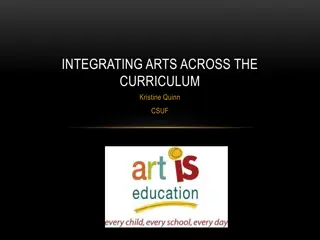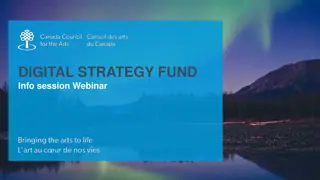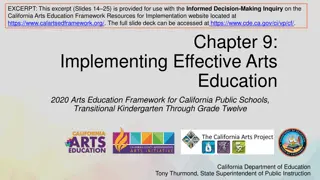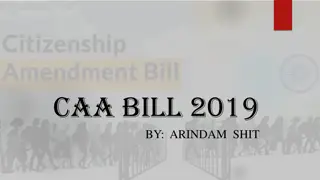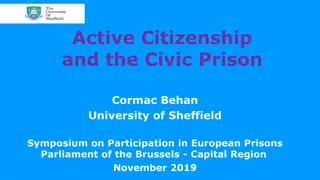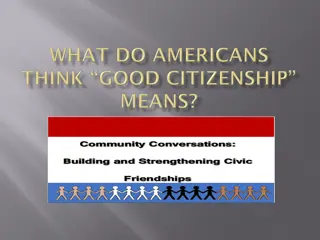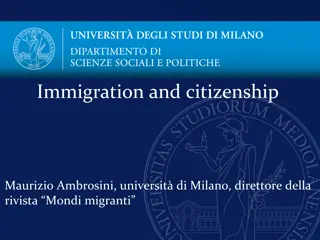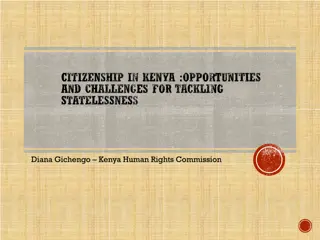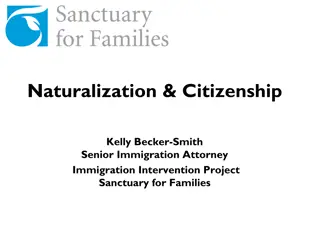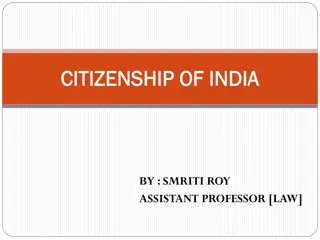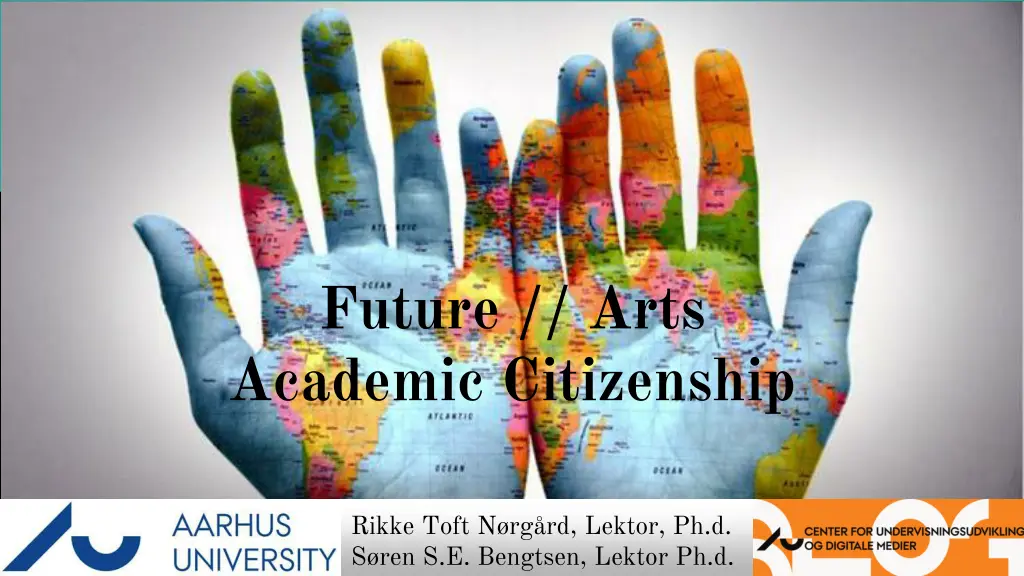
Future Arts Academic Citizenship - Exploring Concepts and Creating Visions
Join the conversation on Future Arts Academic Citizenship to delve into key concepts in arts, academia, and citizenship, focusing on future-making and balancing perspectives. Discover the intersection of imagination, problem-solving, and innovation in shaping future scenarios and societies for a dynamic world ahead.
Download Presentation

Please find below an Image/Link to download the presentation.
The content on the website is provided AS IS for your information and personal use only. It may not be sold, licensed, or shared on other websites without obtaining consent from the author. If you encounter any issues during the download, it is possible that the publisher has removed the file from their server.
You are allowed to download the files provided on this website for personal or commercial use, subject to the condition that they are used lawfully. All files are the property of their respective owners.
The content on the website is provided AS IS for your information and personal use only. It may not be sold, licensed, or shared on other websites without obtaining consent from the author.
E N D
Presentation Transcript
Future // Arts Academic Citizenship Rikke Toft N rg rd, Lektor, Ph.d. S ren S.E. Bengtsen, Lektor Ph.d.
Vi vil gerne invitere til en samtale & samtnkning omkring Future - Arts - Academic - Citizenship Pr sentation af nogle n glebegreber inden for de 4 felter => samtalestartere & tanketermer En skitse til Future//Arts der ikke er negativ & defensiv men positiv & konstruktiv => vokabular & handleramme
Future-making: Fremskrivning & spring At udvikle og opdyrke mulige fremtidsscenarier og fremtider gennem fremtids-skabelse => To typer futurology @arts DIAGNOSE - FREMSKRIVNING Konvergent problem-l sning Diagnosticering: at finde problemet Wicked problems Fremskrivning: mulige l sninger M l: finde frem til mulige l sninger p aktuelle samfundsudfordringer Professionelle borgere: bygger p samfundsbehov & erhvervsuddannelse (det kendte & nyttige) FANTASI - SPRING Divergent ide-skabelse Fantasi: at f en ide / at forestille sig Strange ideas Spring: mulige verdener Vision: skabe nye verdener/ fortolkninger der f r ting til at springe andre steder hen Revolutionerende borgere: bygger p samfundsdyder & samfundsvisioner (det ukendte & unyttige)
Fremtids-skabelse = balancering af vgtsklene Several Republicans have portrayed a liberal arts education as an expendable, sometimes frivolous luxury [...] have called for more welders and fewer philosophers [...] criticized anthropologists [...] belittled gender studies [...] Democrats have, for the most part, avoided denouncing the humanities, but they have argued that education and training should be better aligned with the job market (Cohen, 2016) We know that engineering and the humanities differ not just in the subject matter but in the very kinds of thinking they encourage [..] Technology does not proceed along a preordained single path, as one might suppose from a textbook or problem-solving approach. Like literature, engineering sometimes work not by satisfying recognized needs but by creating the needs it satisfies (Ottino & Morson, 2016) Innovation is not simply a technical matter but rather one of understanding how people and societies work, what they need and want. America will not dominate the 21st century by making cheaper computer chips but instead by constantly reimagining how computers and other new technologies interact with human beings (Zakaria, 2015)
Future//Arts - Arts//Futures Arts som fagligt bosted - at bygge bosteder p og have Future//Arts som hjemstavn Arts fakultetet som et s rligt sted at bo der skaber s regne rum, pladser og milj er Fremtidsskabelse 1: Arts living guilds (guidelines for fremtidens Arts-milj ) Arts som fag-identitet - at udivkle en signatur for Future//Arts Arts didaktik, p dagogik, l ring & dannelse som en s rlig signatur der skaber s regne h nder, hoved & hjerte Fremtidsskabelse 2: Arts signaturer i bredden & dybden (workshop i oktober) Arts som vidensfelt - samskabelse af kraft-eksempler p Future//Arts Arts forskning, undervisning & udvikling som en s rlig viden der skaber s regen t nkning, tilgang og tilv relser i verden Fremtidsskabelse 3: Arts wicked problem/strange ideas kraft-eksempler &
Academic: Universitetet i, for og fra samfundet Modus 1-universitetet (egen-v rdi & tempel for det oplyste liv ) Viden: Lukker sig om sig selv og disciplinen, universel, samfundskommenterende, samfundsopdragende Uddannelse: Uddanner indad, forskning og formidling, selvopretholdende, lukket originalitet Institution: Mangel p samfundsm ssig interesse og engagement, lukket geografi, lukket ontologi Modus 2-universitetet (nytte-v rdi & fabrik for fremtidens arbejdskraft ) Viden: Retter sig mod samfundets behov, situeret, politisk drevet, konomisk forankret Uddannelse: Uddanner udad, omskiftelig, kompetencestyret, f rdighedsorienteret, probleml sende Institution: Producent, industri, problemknuser, task force, ben geografi, lukket ontologi Modus 3-universitetet (samfunds-v rdi & medborgerhus for kritisk samfundsskabelse ) Viden: Unders gende samspil med samfundet omkring v rdier, kultursyn, social identitet, mening, f llesskab Uddannelse: Dialog med institutioner, organisationer, virksomheder, sociale milj er, offentligheden, borgerne Institution: Kritisk engagement som er historisk bent, geografisk bent, ontologisk bent
Barnett, 2015 Graduates will do their professions or their organizations no service if they simply live out, however, reflectively, the roles assigned to them. Critical action demands that persons fully inhabit their actions; that they are brave enough to live out their understandings in the world. Without this bravery, without this living out of one s comprehensions, a person s life is diminished, but so, ultimately, are our institutions. Despite itself, the corporate world ultimately requires real selves, three-dimensional selves inhabiting all three domains of critical being. ( ) If students are to prosper in the modern world, if they are to carry their world forward in worthwhile fashion, they have to become critical persons embodying critique in the three dimensions of knowing, of self, and of the world at the same time. (Barnett, 2015, p.68-69) Of course, mere exposure to the wider society is not synonymous with an exposure, still less an engagement with the public sphere. The public sphere will only open if it enters the being of the student as having a claim on the student. To a large extent, curricula can be designed with the development of (...) knowledge citizenship in mind. (Barnett, 2015, p.25)
Citizenship: Modus 3-universitetet Viden: Kritisk faglighed Integration af kritisk viden (faglig viden og metode), kritisk v ren (personlig mening, kulturel v rdi), og kritisk handlen (samfundsm ssigt bidrag, social sammenh ngskraft) Uddannelse: Beboelse Lyttende og opm rksom p omverden: Tale p vegne af andre, p vegne af dem, der ikke er her mere, der ikke selv kan tale, er forhindret i at tale, dem der kommer engang, endnu ikke har deres egen stemme Samler (Gestell, gathering), samfundsm ssig samlen, drager dom ner n r, skaber sammenh ngskraft Institutionen: Medborgerskab (Gen-)Forbindelse af institutionen med den generelle livsverden (samfundet), etisk og moralsk dimension Akademiske dyder: Sandf rdighed, oprigtighed, autenticitet, mod, storsindethed (magnanimity), omsorg
Nixon, 2008 Chief among those virtues are accuracy and sincerity: the former (accuracy) relates to the problem of ensuring that one s beliefs are true; the latter (sincerity) to the problem of how one ensures that one s assertions express what one actually believes. What is primary at stake is our capacity for, and commitment to, truthfulness. In pursuing truth we are less concerned with the nature of truth and increasingly concerned with what it means to be truthful to ourselves and others. (Nixon, 2008, p.56) What is at issue is the moral ontology of professional practice. It is precisely because morality is ontological involved in my development as a moral agent that the virtues of truth, respect, and authenticity hang together: truthfulness is unrealiseable without respect; and truthfulness and respect rely, crucially, on the virtues of authenticity. (Nixon, 2008, p.81)
4-rums model for udvikling af Future//Arts ARTS STEDER ARTS STEDER ARTS SIGNATURER ARTS SIGNATURER Faglige signaturer i bredden Faglige signaturer i bredden Faglige signaturer i dybden Faglige signaturer i dybden Forskning, undervisning, udvikling Forskning, undervisning, udvikling Salonen, atelieret, scenen, museet, biblioteket, Salonen, atelieret, scenen, museet, biblioteket, skrivekammeret, studiet skrivekammeret, studiet Opdyrkning af f llessteder & faglige steder Opdyrkning af f llessteder & faglige steder @Arts i verden @Arts i verden FUTURE//ARTS FUTURE//ARTS ARTS//FUTURES ARTS//FUTURES ARTS SAMSKABELSE ARTS SAMSKABELSE Vidensformer: Kraft Vidensformer: Kraft- -eksempler @Arts V rensformer: h nd, hoved, hjerte @Arts V rensformer: h nd, hoved, hjerte @Arts Institutionsformer: Modus 3 universitetet Institutionsformer: Modus 3 universitetet @Arts i verden @Arts i verden ARTS SAMFUNDSV RDI ARTS SAMFUNDSV RDI Dyder & Visioner Dyder & Visioner Fremtidsskabelse: fremskrivning & spring Fremtidsskabelse: fremskrivning & spring Medborgerskab: samspil, dialog, kritisk Medborgerskab: samspil, dialog, kritisk engagement engagement eksempler @Arts
Referencer 7 anbefalinger til det fysiske studiemilj , Aarhus Universitet 2016 Adamson, G. (2007). Thinking through Craft. Oxford: Berg Publishers. Arvanikatis, J. & Hornsby, D.J. (Eds.) (2015). Universities, the Citizen Scholar and the Future of Higher Education. New York: Palgrave Macmillan. Barnett, R. (2004). Learning for an unknown future, Higher Education Research & Development, 23:3, 247-260 Barnett, R. (2015). A Curriculum for Critical Being. In Davies, M. & Barnett, R. (Eds.). The Palgrave Handbook of Critical Thinking in Higher Education. (pp.63-77). New York: Palgrave Macmillan Barnett, R. (2017 - in press). The Coming of the Ecological University. London & New York: Routledge Barnett, R. & Bengtsen, S. (2017). Universities and Epistemology: From a Dissolution of Knowledge to the Emergence of a New Thinking. Education Sciences, 7(1), 38 Bengtsen, S. & Barnett, R. (2017a). Confronting the Dark Side of Higher Education. Journal of Philosophy of Education, 51:1, 114-131 Bengtsen, S. & Barnett, R. (2017b - in press). Realism and education: A philosophical examination of the realness of the university. In Higgs, P. & Waghid, Y. (Eds.). A Reader in Philosophy of Education (pp.121-137). Capetown: JUTA & Company
Referencer Bengtsen, S. & Barnett, R. (Eds.) (2018 - forthcoming). The Thinking University. A Philosophical Examination of Thought and Higher Education. Dordrecht & New York: Springer Publishing Bengtsen, S. & N rg rd, R.T. (2014). Becoming jelly. A call for gelatinous pedagogy within higher education. Proceedings of the 9th International Conference on Networked Learning 2014, Edited by: Bayne S, Jones C, de Laat M, Ryberg T & Sinclair C. ISBN 978-1-86220-304-4 Cohen, P. (2016). A rising call to promote STEM education and cut liberal arts funding. In: The New York Times, Feb. 21 2016. Filippakou, O. & Williams, G. (Eds.) (2015). Higher Education As a Public Good. Critical Perspectives on Theory, Policy and Practice. New York: Peter Lang. Fung, D. & Carnell, B. (2016). UCL Connected Curriculum: Enhancing programmes of study. University College London, UK Gregerson, M.B., Snyder, H.T. & Kaufman, J.C. (2013). Teaching creatively and teaching creativity. New York: Springer. Gurung, R.A.R., Chick, N.L. & Haynie, A. (2009). Exploring Signature Pedagogies. Approaches to teaching disciplinary habits of mind. Stylus Publishing. Innovating Pedagogy 2016: Exploring new forms of teaching, learning and assessment to guide educators and policy makers,
Referencer Macfarlane, B. (2010). The Academic Citizen. The virtues of service in university life. London & New York: Routledge Nelson, H.G. & Stolterman, E. (2012). The Design Way: Intentional change in an unpredictable world. Cambridge: The MIT Press. Nixon, J. (2008). Towards the Virtuous University. The Moral Bases of Academic Practice. London & New York: Routledge N rg rd, R.T., Arndt, S. & Bengtsen, S. (2017 - in press). The defiant university: places of resistance and spaces for transgression in higher education. Abstract for the philosophy of higher education conference The Purpose of the Future University , Aarhus University, November 6th-8th, 2017 N rg rd, R.T. & Bengtsen, S. (2016). Academic citizenship beyond the campus: a call for the placeful university. Higher Education Research & Development, 35:1, 4-16 N rg rd, R.T. & Bengtsen, S. (2018 - forthcoming). The Worldhood University: a university for things, places, designs, and thinking in dialogue. In. Bengtsen, S. & Barnett, R. (Eds.). The Thinking University. A Philosophical Examination of Thought and Higher Education. Dordrecht & New York: Springer Publishing N rg rd, R.T. & Brandt, C. (2016). Technological imagination and divergent design thinking in the educational design studio beyond STEAM. Conference paper for the Oxford Ethnography and Education Ceonfrence 2016, 19-21 September, New College, Oxford University, UK.
Referencer N rg rd, R.T. & Paaskesen, R.B. (2016). Open-ended education: How open-endedness might foster and promote technological imagination, enterprising and participation in education. Conjunctions: Transdiciplinary journal of cultural participation, 3(1), pp.1-25. Ottino, J.M. & Morson, G.S. (2016). Building a bridge between engineering and humanities. In: The Chronicle of Higher Education, Feb 14 2016. Retrieved from: http://chronicle.com/article/Building-a-Bridge-Between/235305 Sennett, R. (2008). The Craftsman. London: Penguin Books. Shulman, L.S. (2005). Signature pedagogies in the professions. Daedalus, 134; 3, 52-59. Temple, P. (Ed.). The physical university. Contours of space and place in higher education. London: Routledge Trend Report 2016: How technological trends enable customised education, SurfNet Yelavich, S., & Adams, B. (Eds.) (2014). Design as future-making. New York: Bloomsbury Academic Zakaria, F. (2015). Why America s obsession with STEM education is dangerous. The Washington Post..

